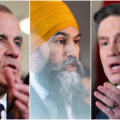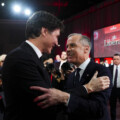It’s over.
The feeling of relief was intense as I finally clicked the button that would deactivate my public-facing social media accounts.
It had only been a week since I was defeated in my bid for re-election to the provincial parliament. And despite a whirlwind of different emotions—high and lows—one thing was very clear to me: I wanted to be away from social media.
Like most modern-day politicians, my political journey started with a post. I proudly announced to my Facebook friends that I would be “sharing some big news” in a few days. As a Millennial candidate, I was excited to harness the power of this tool as I started campaigning.
Once elected, it seemed only natural that the second youngest MPP would be a social media “guru”. Colleagues would ask for my advice, assuming that my youth meant I had a master’s degree in “the Facebook”.
In the beginning, I loved it. Social media has given politicians the power to bypass traditional media outlets and get their message directly to constituents, unfiltered. My team took to the challenge, producing videos, personal messages, ads, and more. And much to our surprise, the audience for our Facebook content was not what we had originally assumed. Our content was being consumed by the over-50 crowd, particularly women. Given that age continues to be a strong predictor of the likeliness to vote, this was good news.
Naturally, our content attracted a fair number of detractors.
At first, the criticism and abuse bounced off. Fresh from victory, it seemed easy to let the negative comments slide. I even floated the idea with some colleagues of producing a politician version of the famous Jimmy Kimmel skit “Mean Tweets”, with a collection of some of our favourite attacks we’d all received.Mean Tweets – Political Edition https://www.youtube.com/watch?v=0rDbWz63wiQ
My staff took particular glee in one commenter who, after observing my physique in a particular photo, dubbed me “bitch tits”—a moniker they continued to use before disappearing into the Twitter troll pit they came from. I laughed it all off. As the adage goes: you need a thick skin to be in politics.
But as time went on, the abuse became thicker, heavier. It didn’t matter what the post or tweet was about—inevitably someone would pop on with something nasty to say. I’d often wonder to myself: was this normal before social media? Did politicians in the pre-Facebook era deal with daily abuse from onlookers and members of the public? Where was the sense of respect for the institution?
About a year onto the job, I had my first instance of someone wishing I was dead online.
The tweet in question read: “I hope they do to you what they did to Ghadafi”. I assume they meant beaten to death and then paraded for all to see, as had been the fate of the deposed Libyan tyrant.
It wouldn’t be the last time I was threatened online.
About this time, I engaged in a very public battle to get the struggling Ontario Autism Program on better footing. It was a calling for me, given that my own brother was on the autism spectrum.
My social media would never be the same from this point on.
Frantic parents, desperate to help their kids, began to flood my accounts with pleas, criticism, and, unfortunately, abuse.
On New Year’s Eve, I was sitting with my grandparents celebrating the holiday. My phone dinged, and I saw I had a Twitter mention notification.
It read something like this: “Here is Jeremy Roberts’ personal phone number. Call him and tell him what an awful POS he is”.
I stared, stunned, at my phone.
Thankfully, a brief conversation with the helpline at Twitter meant that the tweet was removed. But the feeling remained.
I knew that being a politician meant sacrificing much of your personal life. Work would inevitably bleed into your home life. One need only look at how much criticism both Premier Ford and Prime Minister Trudeau have taken for visiting their respective cottages at various times.
But sitting there, in my grandparents’ living room, it really hit home. Social media has made it so that your work—and more importantly your work critics—can follow you even into your most private and cherished times. This seemed very wrong.
COVID made the problem worse. With a mixture of genuine people in distress and conspiracy theory nutters, the rhetoric on social media heated up another notch. It became a daily occurrence to be accused of everything from mass murder to Nazi-style totalitarianism. The barrage online was heavy and unrelenting.
It was around this time that I deleted Twitter off my phone. I was tired of waking up every day to harassment. My mental health was suffering.
And make no mistake, what politicians are dealing with on their social media pages these days is harassment. It is not a genuine desire to engage in thoughtful debate and discourse. It is a premeditated attempt by individuals to try and cause emotional harm to the politician they disagree with.
Documented cases—particularly by my female colleagues at different levels of government—provide further evidence of this abuse. Both Catherine McKennaThreats, abuse move from online to real world, McKenna now requires security https://www.cbc.ca/news/politics/threats-abuse-move-from-online-to-real-world-mckenna-now-requires-security-1.5274766 (a Liberal) and Michelle Rempel GarnerConservative MP Michelle Rempel says she has faced sexism, unwanted touching https://www.cbc.ca/news/politics/michelle-rempel-sexual-harassment-1.3541189 (a Conservative) have been public about the threats and vitriol they have endured online.
Much has been written about the psychology of distress and the mental health implications of the pandemic. The root cause of the vitriol being spewed at politicians (of all stripes) is a topic for a much broader discussion piece, which we can’t cover here.
But what I think merits deeper reflection is this: why have we reached a point where we condemn bullying and harassment in all forms, but feel it is “inevitable” and “unavoidable” for politicians? Are we comfortable as a society subjecting those who choose public service to daily harassment?
I don’t think we should be.
The result of my experience with social media as an elected official didn’t end with anything positive. As I abandoned Twitter and increasingly withdrew from Facebook, my posting was left entirely to staff. Content devolved into simple, hyper-partisan messages and infographics. Any human touch disappeared.
As a result, I became less engaged with that medium of voter connection, and constituents received less authentic content. It reinforced the notion of politicians as distant, inhuman, and uncaring.
Everyone ended up worse off.
I’m certainly not the only politician that chose that route. It was still better than the alternative of waking up every day to more abuse waiting on your bedside table.
So how do we deal with this problem going forward? How can we make it so that social media is a tool for constructive discourse, as opposed to abuse? How can we take the fight to bullying on this final frontier?
One method, of course, is to police content and comments. By deleting abusive comments and blocking bullies, we could attempt to purge the negativity out of social media.
But, of course, this method presents serious legal and moral problems. Legally, as we have seen with other cases (e.g. see Ottawa Mayor Jim Watson’s decisionWatson changes tune on Twitter clash https://www.cbc.ca/news/canada/ottawa/mayor-watson-unblocks-critics-twitter-lawsuit-1.4887540 to back down on blocking critics from his Twitter), it is likely not possible given our constitutional right to free speech to simply “block” all of the speech that is undesirable. Moreover, it is also not moral to allow those who govern us to silence any critical voice.
This route, therefore, is fraught with risk and needs much more consideration.
There is, though, another method worth examining: better civic education.
If my experience with social media as an elected official was the worst part of my job, the best parts were the opportunities I had to engage with young people. Particularly, I was always struck by how engaged students became when we discussed my motivations to run. Putting a human face to politics made it seem more relatable, as opposed to the caricatures on television that most people are used to. Sharing my story about my experience with my brother and how that made me want to enter this field provided a tangible example to young people about why politics and politicians are important.
We are in desperate need of better civic education in Canada. For too many (especially those on social media), politicians have become inanimate punching bags. We need to put the humanity back in the profession.
And there’s already some good places to start. Take CIVIX for example, an internationally recognized civic engagement organization based right here in Canada. Known for their Student Vote program in high schools across the country, CIVIX also runs a program called “Rep Day”, whereby they give politicians of different stripes an opportunity to interact with students. The goal: to show students that their representatives are human beings just like them, who are trying to do their best to help the communities they live in. Importantly, rather than trying to obliterate partisanship in the school altogether (unrealistic given the reality), this program takes a multi-partisan approach and shows that, regardless of party, most politicians are driven by a common desire to affect positive change.
Programs like this deserve more support, both from governments and social media organizations. They present a way to bridge the gap between citizenry and elected officials by showing us how much we have in common as opposed to how much sets us apart.
Decades ago, bullying on the schoolyard was seen as “character building” and “part of the experience of growing up”. Now it is taboo, thanks in large part to a shift in our education.
Through better civic education, I believe we can start to eradicate bullying from our political discourse as well, for the betterment of all of us.
My political journey is over for now. So too is my social media. But for the countless people considering whether to run for office, I can only offer a warning. You don’t just need “thick skin” anymore, you need a suit of armor. And unfortunately, the thicker the suit, the harder it will be for people to see the humanity underneath. It’s a self-defeating scenario.
Together, I hope we can start to tackle this problem. If we can’t attract good, decent people to choose elected office, the quality of our government will suffer. The stakes are high.
We can and should do better. Let’s start with respect and remember the humans behind the handle.
Recommended for You

Élie Cantin-Nantel: Poilievre was poised and Carney lacked charisma: A francophone’s take on the French-language leaders’ debate

‘There was no knockout punch’: Jean Philippe Fournier on a lacklustre French-language leaders’ debate

‘The power to impose tariffs at will needs to be removed from Trump’: David Frum on Trump’s disregard of the courts and how the trade war tremors will affect the U.S. economy

Need to Know: Carney tried to distance himself from Trudeau during the French-language debate. It’s a hard case to make



